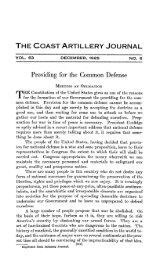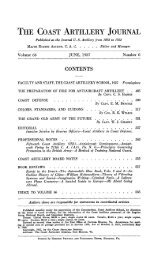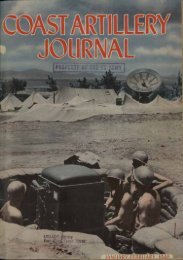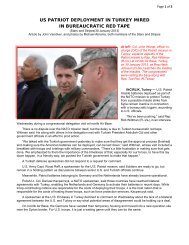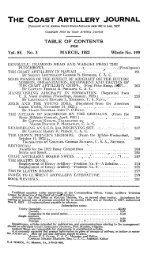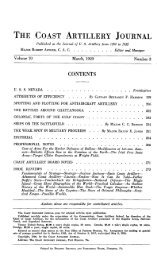Activation of new aaa units - Air Defense Artillery
Activation of new aaa units - Air Defense Artillery
Activation of new aaa units - Air Defense Artillery
You also want an ePaper? Increase the reach of your titles
YUMPU automatically turns print PDFs into web optimized ePapers that Google loves.
19-f.S 1\1ANAGING MEN 39<br />
which their minds cannot comprehend. Once you give<br />
him a joh that he can handle, let him stay there if at all<br />
possible-for his limited number <strong>of</strong> brain cells make it difficult<br />
for him to learn <strong>new</strong> things each day.<br />
NEUROSES (NERVOUSNESS)<br />
;\lost psychiatric cases In the army will fall in the group<br />
called "neuroses." You will see manv neurotic cases in<br />
training camps and on the battlefield. In days gone by,<br />
many soldiers suffering from nervousness \\'ere called<br />
"gold-bricks" and through mistreatment the army lost the<br />
use <strong>of</strong> many men who might otherwise have been com'erted<br />
into valuable soldiers.<br />
A neurotic man is not insane. Neuroses are conditions<br />
which most persons call nervousness although in the extreme<br />
forms these men appear to suffer from a physical illness<br />
or even a mental disease. Normal people may develop<br />
nervousness, and soldiers are particularly prone to nervous<br />
reactions when thev first enter the militarv service and<br />
when they are on the battle front. Nevertheless, by proper<br />
understanding <strong>of</strong> these nervous states, the platoon sergeant<br />
can do much to prevent and cure them.<br />
It is interesting to note that the same conditions which<br />
will bring about neuroses among soldiers will also increase<br />
in the military unit the AWOL rate, the number <strong>of</strong> courtmartials,<br />
the 'venereal disease rate, and the sick call rate.<br />
The reverse is also true, when the causes <strong>of</strong> neuroses are<br />
removedin an army camp the!e will simultaneously be a decrease<br />
in AWOLs, sick call rate, etc.<br />
The Causes.<br />
>I- >I- >I-<br />
There are two sets <strong>of</strong> causes <strong>of</strong> nervous reactions: Personality<br />
causes and precipitating causes.<br />
Personality causes have their bases in the nervous personality<br />
which in turn is usually the result <strong>of</strong> a poor childhood<br />
environment. The important thing about environment<br />
is not the financial background but the kind <strong>of</strong> parents<br />
one has, the nature <strong>of</strong> the childhood training, the development<br />
<strong>of</strong> habits <strong>of</strong> self-reliance, decencv, and belief in<br />
certain social standards. Children learn p~imarily by example,<br />
and it is easv to understand how the child becomes<br />
irritable, complaini~g, and emotional \\'hen a father comes<br />
home tired, irritable, complaining, and "takes it out" on his<br />
wife and children. It is easv to understand how the child,<br />
who imitates like a monke)7,becomes cross, nagging, unhappy<br />
and fearful when the mother is always cross, nagging,<br />
unhappy and crying. When families are very poor,<br />
tempers are <strong>of</strong>ten short and emotional instabilitv more<br />
common, but it is the instabilitv in the home, not the lack<br />
<strong>of</strong> money, that makes men unstable. There are manv families<br />
thro~ghout this 'world \vhich have little food ari'd poor<br />
homes, but do have a nice kind <strong>of</strong> family life and rear<br />
children \'I.'hoare self-reliant, decent, kind a'nd determined.<br />
There is much more to the development <strong>of</strong> personality<br />
than these home factors-but it is important to recognize<br />
the fact that most men <strong>of</strong> 18 who enter the army haye not<br />
been awav from home, and that what the\' think and feel.<br />
the \Yaythey react to life, the emotions a~d the prejudice~<br />
they carry, their self-reliance or lack <strong>of</strong> it-all these are the<br />
resultnot <strong>of</strong> their own choosinv but <strong>of</strong> the em'ironment in<br />
i'"><br />
which they were brought up. Men begin to change their<br />
environment and their feelings when they begin to thinkand<br />
most men do not really begin to think for themselves<br />
till after the age <strong>of</strong> 16-or 18.<br />
For this reason it is difficult to "blame" I8-year-old soldiers<br />
who have poor personalities, since their personalities<br />
have been made for them, in most cases, by their parents<br />
and their environment. Their personalities can be changed<br />
but unfortunately it is usually the school <strong>of</strong> hard experience<br />
that does the changing. In a civilian army, we do not have<br />
the time to remold personalities, for good fighting men are<br />
needed-and quickly.<br />
Physical Signs <strong>of</strong> Neuroses<br />
Many <strong>of</strong> the signs <strong>of</strong> nervousness are not recognized by<br />
the average man. Often symptoms \,,:hich seem to be definitely<br />
physical in character have their basis in a neurosis,<br />
and many other symptoms which seem to be the result <strong>of</strong>.<br />
malingering (gold-bricking) stem from a high degree <strong>of</strong><br />
emotional instability. To further complicate the picture,<br />
there are real physical diseases which result from nervousness,<br />
such as high blood pressure, headaches, vomiting,<br />
diarrhea, pains over the heart, etc. Neurotic symptoms may<br />
be physical or "mental" in character, arid hm'e to be studied<br />
separately.<br />
Let us suppose you were in bivouac "over there" and<br />
awakened in the middle <strong>of</strong> the night to see an armed soldier<br />
standing at the edge <strong>of</strong> the woods. If in the dim night<br />
light the un'iform which the soldier wore seemed to you to<br />
be that <strong>of</strong> thb enemy, your heart would begin to beat fast.<br />
The usual explanation given for the rapid beating <strong>of</strong> your<br />
heart would be that you were excited-but just exactly what<br />
was the physical connection between your heart and a man<br />
standing some 20-30 yards from you? If you thought that<br />
man had an American uniform, vour heart would not have<br />
increased its beat..<br />
The eye saw the soldier. Impulses are sent from the eye<br />
to the brain. It is at the brain level that something happens<br />
'''-7hichdetermines whether the heart beats fast or not. If the<br />
brain INTERPRETS the stimulus coming from the eye as<br />
something which is dangerous to the man, then the brain<br />
becomes "excited." In medical discussions, we never speak<br />
<strong>of</strong> the brain becoming excited-but for practical purposes<br />
the brain acts as if it had suddenlv been electrified. But it<br />
is most important to keep in miu'd always, that it \'\.'asn't<br />
just the sight <strong>of</strong> a soldier that caused the excitement, but<br />
the interpretation in the brain, which produced an emotional<br />
response. This same principle is true in nearly<br />
everything else which creates fear or emotion in men-it<br />
is not what one sees, or hears, or feels that upsets one-it is<br />
the attitude the brain takes to\vards that stimulus which<br />
creates the excitement. Some men haye developed "emotional<br />
habits': so that almost any unusual sight or sound<br />
will be interpreted as dangerous and thus create an excited<br />
brain. filen who are neurotic tend to have a chronic "emotional<br />
attitude," and the cure <strong>of</strong> their neurotic condition<br />
<strong>of</strong>ten lies in removing this "habit."<br />
The brain is connected through nen'es with every single<br />
part <strong>of</strong> the body. The exact method <strong>of</strong> connection is not<br />
too clearly understood even medically, but \\-hen the brain<br />
>I-



